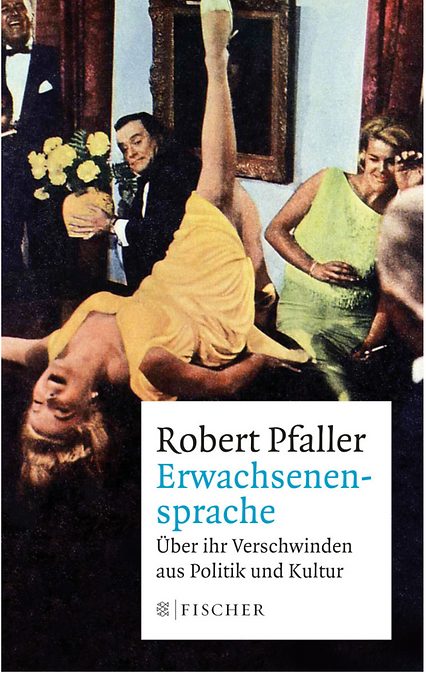
ERWACHSENENSPRACHE
Über ihr Verschwinden aus Politik und Kultur
Robert Pfaller
Überall wird im öffentlichen Diskurs heute auf Befindlichkeiten Rücksicht genommen: Es werden vor Gefahren wie »expliziter Sprache« gewarnt, Schreibweisen mit Binnen-I empfohlen, dritte Klotüren installiert. Es scheint, als habe der Kampf um die korrekte Bezeichnung und die Rücksicht auf Fragen der Identität alle anderen Kämpfe überlagert.
Robert Pfaller, Autor des Bestsellers »Wofür es sich zu leben lohnt«, fragt sich in »Erwachsenensprache. Über ihr Verschwinden aus Politik und Kultur«, wie es gekommen ist, dass wir nicht mehr als Erwachsene angesprochen, sondern von der Politik wie Kinder behandelt werden wollen. Steckt gar ein Ablenkungsmanöver dahinter? Eine politische Strategie? Es geht darum, als mündige Bürger wieder ernst genommen zu werden – doch dann sollten wir uns auch als solche ansprechen lassen.
For pre-order visit the publisher's website
When we stop chasing moral purity and instead look honestly at the fear behind morality, we see how it quietly trades our freedom, scale and impact for the illusion of being a "good person."
Interpassivity
The Aesthetics of Delegated Enjoyment
Robert Pfaller
A radical criticism of current assumptions in the field of cultural theory. Why do people record TV programmes instead of watching them? Why are some recovering alcoholics pleased to let other people drink in their place? Why can ritual machines pray in place of believers?
Robert Pfaller advances the theory of 'interpassivity' as delegated consumption and enjoyment. Applicable to both art and everyday life, the concept allows him to tackle a vast range of phenomena: culture, art, sports and religion. Pfaller criticises dominant assumptions, offers an escape from prevailing ideologies and exposes how cultural capitalism promotes commodities with the promise of happiness.
“Over the last decade, Robert Pfaller has thoroughly renovated the entire field of critical cultural studies. This book focuses on the notion of interpassivity, of the transferring onto others our innermost passive stances – others can cry, laugh or believe for us. This accounts for the strange beliefs which no subject assumes and which nonetheless operate as beliefs in a social field. It is only in this way that we can understand the persistence of ideology in our cynical era. This is why Pfaller’s book is indispensable, an instant classic.”
– Slavoj Žižek
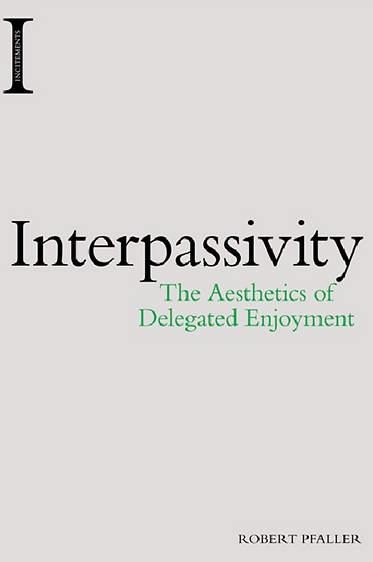
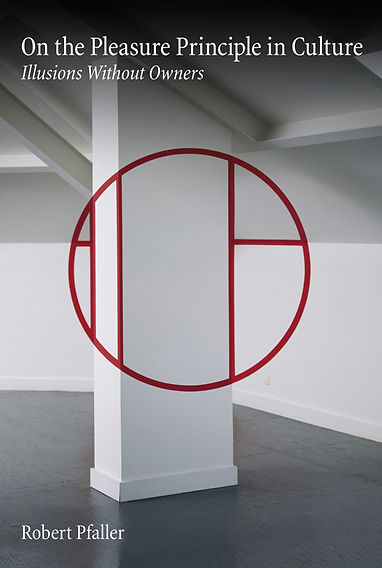
On the Pleasure Principle in Culture
Illusions Without Owners
Robert Pfaller
In this fascinating work of cultural theory and philosophy, Robert Pfaller explores the hidden cost of our contemporary approach to pleasure, belief and illusion. Sports, design, eroticism, social intercourse and games—indeed, all those aspects of our culture commonly deemed "pleasurable"—seem to require beliefs that many regard as illusory. But in considering themselves above the self-deceptions of the crowd, those same sceptics are prone to dismissing a majority of the population as naive or misguided. In doing so, they create a false opposition between the 'simple' masses and their more enlightened rulers. And this dichotomy then functions as an ideological support for neoliberal government: citizens become irrational victims, to be ruled over by a protective security state. What initially appears to be a universal pleasure principle—the role of "anonymous illusions" in mass culture—in this way becomes a rationale for dismantling democracy.
Kurze Sätze über Gutes Leben
(Short Sentences about Good Life)
Robert Pfaller
Das Vademecum der Lebenskunst
Nach dem großen Erfolg von Robert Pfallers Studie ›Wofür es sich zu leben lohnt‹ sind in dem vorliegenden Band alle Interviews in Originalfassung versammelt, die rund um die Themen dieses philosophischen Bestsellers kreisen: Genuss und Verbot, Rauchen und Neoliberalismus, Glück, Neid und – natürlich – die Liebe. Eine Vertiefung und Weiterentwicklung seiner Ideen, aber auch eine Einführung in Robert Pfallers Gedankenwelt.
The Vademecum of the Art of Living
A collection of interviews with Robert Pfaller following the great success of his book What is Worth Living For. The interviews revolve around the themes laid out in his philosophical bestseller: pleasure, smoking bans and neoliberalism, happiness, jealousy, and - of course - love. The book is both a deepening and development of his ideas, but also an introduction his thought.

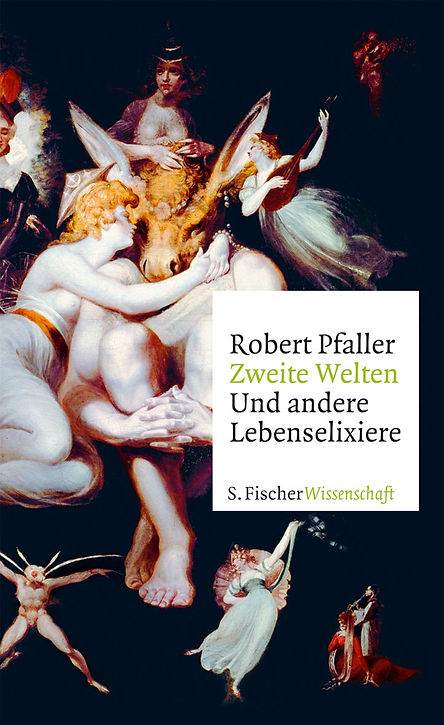
Zweite Welten und Andere Lebenselixiere
Robert Pfaller
»Warum lebt kaum jemand so, wie er es richtig findet?« Nach dem großen Erfolg von »Wofür es sich zu leben lohnt« treibt Robert Pfaller seine Kulturkritik in politischer Absicht weiter. Die erste Welt ist die unseres wirklichen Lebens mit allen Mühen, Frustrationen und Kompromissen. Die zweite Welt ist die der Träume, Wünsche und Illusionen. Wie hängen beide zusammen? Braucht man die zweiten, um die erste zu ertragen? Er untersucht die komplizierte Dialektik von Realität und Wunsch und entfaltet sie an so unterschiedlichen Themen wie dem Staunen, der Illusion, der Komödie oder der Katharsis, der Serie »Sex and the City« oder dem Phänomen der »Interpassivität«. Seine Diagnose: Wenn wir keine Phantasie mehr haben, aus der wir erleichtert ins Leben flüchten können, gerät uns das Leben selbst zu einem auswegslosen Alptraum.
"Why does anyone hardly live the way he finds it right?" After the huge success of his book What is Worth Living For, Robert Pfaller developes further his line of cultural criticism. The first world is the real life with all of our troubles, frustrations and compromises. The second is the world of dreams, desires and illusions. How do they relate to each other? Do we need the second in order to endure the first? The book examines the complex dialectic between reality and desire, using as varied subjects as the wonder, illusion, comedy, or catharsis, the TV series Sex and the City or the phenomenon of "interpassivity." His diagnosis: When we have no more phantasies from which we can escape into real life with relief, life itself turns into a hopeless nightmare.
Das Schmutzige Heilige und die reine Vernunft
Robert Pfaller
Vieles, was noch vor wenigen Jahren als mondän galt wie z.B. das Rauchen, wird in unserer heutigen Kultur als schmutziges, gesundheitsgefährdendes Ärgernis thematisiert. Früher wurden solche Praktiken kulturell aufgehoben, indem man sie in einen Rahmen des »Heiligen« stellte. Gegen dieses »Heilige« macht nun eine Vernunft Front, die sich als »rein« versteht und die Welt entzaubern möchte.
Much of what was even few years ago considered chic in our culture, such as smoking, is today labeled as dirty, and the associated health risks an offense. In the past, such practices were culturally placed in a framework of the "sacred". Against this "sacred", reason that sees itself as a "pure", constantly pushes to demystify the world.
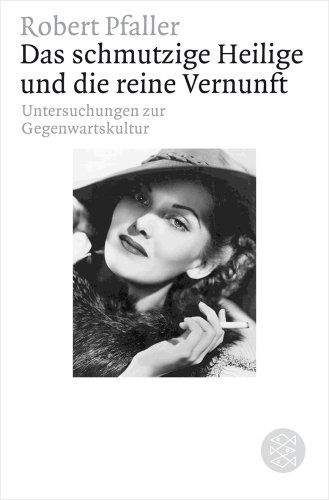
Ästhetik der Interpassivität
Robert Pfaller
Menschen, die Filme aufzeichnen, statt sie anzusehen. Studenten, die Texte kopieren, statt sie durchzuarbeiten. Bücherfreunde, die Bücher im Regal reihen, statt sie zu lesen. Solche Phänomene erfasst Robert Pfaller mit dem Begriff der »Interpassivität«, also der Delegation des Genusses an andere Menschen, an Geräte, Tiere oder Pflanzen. Ausgehend von der Grundfrage, warum die Leute ihren Genuss nicht haben wollen, sondern ihn anderen zuschieben, entwickelt Pfaller eine Ästhetik der Interpassivität, die er sowohl in ihren theoretischen Prinzipien als auch in kleinen Fallstudien (z.B. zu Adi Hoesle, Robert Jelinek, Dostojewski und zum Tanz) entfaltet.
People who record movies instead of looking at them. Students who copy texts rather than work through them. Book lovers, who store books in shelfs rather than reading them. Robert Pfaller captures such phenomena through his concept of "interpassivity", that is the delegation of pleasure to other people, to equipment, animals, or even plants. Starting from the basic question of why people do not want their enjoyment and instead push it onto others, Pfaller develops an aesthetic of interpassivity, which he unfolds both through theoretical principles and through small case studies (Adi Hoesle, Robert Jelinek, Dostoevsky and dance).

